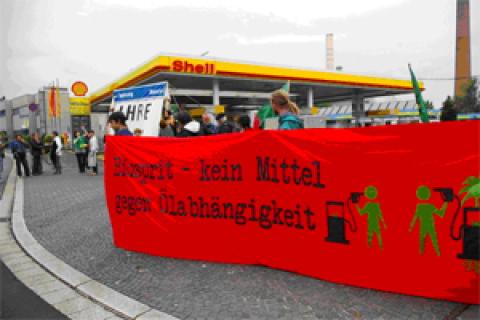Paper is a material many people in industrialised countries take entirely for granted. Millions of trees are felled, pulped, made into paper, printed on, then binned without even being read. Why is it that we treat cotton, linen and other fabrics made from plant fibres with great respect – laundering them carefully, even mending them when they tear – yet we toss barely used sheets of paper into the rubbish bin that are pulped from trees, the oldest living organisms on the planet?
Bulletin articles
Since the early 1960s, world consumption of paper and paperboard has increased by almost seven times. Every year, each person in the UK gets through an average of more than 200 kilogrammes of paper. In the US the figure is almost 300 kilogrammes. Global paper consumption is massively inequitable. In Laos, for example, people use on average less than one kilogramme of paper a year. Yet rural communities in Laos are currently faced with the rapid expansion of eucalyptus plantations to meet the global paper industry's demands for raw material.
"When I use a word," said Humpty Dumpty to Alice, "it means just what I choose it to mean - neither more nor less." Welcome to the Looking-Glass World. Not that of Lewis Carroll's "Through the Looking-Glass", but that of the Confederation of European Paper Industries. CEPI represents 800 pulp and paper companies in 18 European countries, producing more than one-quarter of world paper production.
World hunger is a source of ever greater concern for those who have yet to suffer from it, and ever greater suffering for those who already do – and who are growing in numbers year after year. Yet the policies being formulated in the global power centres not only do little to solve the problem of hunger, but actually tend to even further exacerbate it.
Agrofuels are increasingly drawing words of warning, protest and condemnation from such disparate voices as high-level United Nations representatives like FAO Director-General Jacques Diouf and Special Rapporteur on the Right to Food Jean Ziegler, statesmen like Fidel Castro, and social organizations in both the North and South (see notes 1 and 2). Nevertheless, plantations of crops raised specifically to produce fuel continue to spread.
In the first weekend of May, a cyclone ravaged Burma. Cyclone Nagris hit the Irrawaddy delta with winds reaching 190km/h. However, most havoc was played by a sea surge that came with the storm: a wave up to 3.5m high swept away and inundated half the houses in low-lying villages. People couldn’t flee and figures of dead people are estimated at more than 100,000.
Parojnai was his name. He was from the Ayoreo-Totobiegosode indigenous people who inhabit the Chaco forest stretching from Paraguay to Bolivia and Argentina, south of the Amazon basin.
In Africa, agrofuel initiatives are proliferating in many countries including Zambia, where jatropha has been selected as the main crop to produce biodiesel while sugar cane, sweet sorghum and cassava are chosen for bioethanol.
Millions of people throughout the world live in rural areas and to a greater or lesser extent depend on forest ecosystems for their livelihoods. However, forest degradation and deforestation are occurring at alarming rates, thus endangering their lives.
The Convention on Biological Diversity (CBD) is an international governmental process which looked pretty nice when it was born in 1992, under the UN Earth Summit that took place in Rio de Janeiro, Brazil.
Once upon a time … the governments of the world got together and agreed that the Earth was facing severe environmental problems and that something needed to be done about it. The historic event was named the Earth Summit and it took place in 1992 in the tropical scenario of Rio de Janeiro.
Everyone was feeling very enthusiastic because governments had committed themselves to a new type of development -which they defined as “sustainable”- which would prevent the negative environmental impacts of the until then prevailing development model.
Today the world – the people’s world – is helplessly witnessing a global crisis due to a steep rise in the price of foodstuffs which, as all disasters, affects the more vulnerable sectors, the more dependent economies, the more impoverished countries, more seriously.

